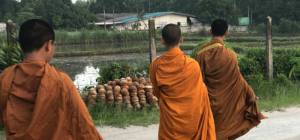
Rebirth by Amitabha-recitation in 10 times
Master Tanluan (476??542 CE), a prominent patriarch in Pure Land Buddhism, interpreted ‘reciting Amitabha ten times’ with an analytical set of 8 questions and answers. It helps to address the worries and doubts of most Pure Land practitioners, who worry about the influence of karmic forces that keep them in the Six Realms, and who might also doubt the inconceivable power of Amitabha Buddha to take them to the Land of Bliss near the end of their lives. It also facilitates them to build sincere faith and full confidence, and trust in the exclusive Amitabha-recitation that is essential to lead them to the Land of Bliss.
“To be reborn in the Land of Bliss by sincerely reciting Amitabha’s name even only ten times” is clearly stated in the 18th vow. Upon hearing this vow, some people may simply believe it and entrust themselves to Amitabha’s salvation. They are straightforward practitioners that strictly follow what the Buddha says and wishes, and exclusively recite Amitabha’s name until the end of their lives. These people have superior roots in faith, as their belief is based on the fundamental vow made by Amitabha Buddha, the trustworthy enlightened one with perfect wisdom and virtues.

In the Contemplation Sutra, Shakyamuni Buddha spoke of nine rebirth grades and levels to illustrate the validity of Amitabha’s 18th vow. There are nine classes of rebirth: The high, medium and low form of rebirth for the highest grade (3 classes); the high, medium and low form of rebirth for the middle grade (3 classes); the high, medium and low form of rebirth for the lowest class (3 classes). Here is one extract about rebirth on the lowest level of the lowest grade:
“Those who attain birth on the lowest level of the lowest grade are the sentient beings who commit such evils as the five gravest transgressions [patricide, matricide, killing an arhat, spilling a Buddha’s blood, and causing schism in the sangha], the ten evil acts [the three physical evils of killing, stealing, and sexual misconduct; the four verbal evils of lying, flattery or indiscriminate and irresponsible speech, defamation, and duplicity; and the three mental evils of greed, anger, and foolishness or the holding of mistaken views] and all kinds of immorality. Owing to such evil karma, the fool like this will fall into evil realms and suffer endless agony for many kalpas.
When he is about to die, he may meet a good teacher, who consoles him in various ways, teaching him the wonderful Dharma and urging him to be mindful of the Buddha; but he is too tormented by pain to do so. The good teacher then advises him, ‘If you cannot concentrate on the Buddha, then you should say instead, Homage to Amitayus Buddha.’ In this way, he sincerely and continuously says ‘Homage to Amitayus Buddha’ [Namo Amituofo] ten times.
Because he calls the Buddha’s Name, with each repetition, the evil karma which he has committed during eighty kotis of kalpas of Samsara is extinguished. When he comes to die, he sees before him a golden lotus-flower like the disk of the sun, and in an instant he is born within a lotus-bud in the Land of Utmost Bliss.
After twelve great kalpas the lotus-bud opens. When the flower opens, Avalokitesvara and Mahasthamaprapta teach him with voices of great compassion the method of extinguishing evil karma through the realization of Suchness of all Dharmas. Hearing this, he rejoices and immediately awakens aspiration for Enlightenment. Such a person is called one who attains birth on the lowest level of the lowest grade. These three together are known as the contemplation of the lowest grade of aspirants and the sixteenth contemplation.
Possible responses
After reading about this grade of rebirth, people may have different responses. The most common one might go like this: ‘It’s not fair! How can an evil person be reborn in ‘heaven’ (pure land) with joy? In our world, many good people continue to suffer from reincarnation with the Six Realms after they die. It’s contrary to the law of cause and effect.”
Some of them may even say,” Don’t let the evil people read this scenario of rebirth, otherwise they will never repent. This scenario of rebirth may encourage them to continue to commit evil acts and all kinds of immorality, because they may escape from ‘punishment’ by simply reciting Amitabha’s names ten times near the end of their lives. I don’t like it and I don’t agree with it, so I will not accept it.”
Some Buddhists may feel a bit depressed and sneer: “In this case, what is the point for me to cultivate diligently, and to do good deeds? Should I give up Buddhist practices and do whatever I want till I die? As long as I can recite Amitabha’s name ten times at the near end of my life, I’ll just be reborn in the Pure Land anyway?”
These are understandable responses from ordinary beings. They think from their own perspective, on their own side, and of their own interests and concerns, but not from Amitabha’s perspective, on his side, and from his concern.
The purpose of stating the possibility of rebirth on the lowest level of the lowest grade is to reveal the greatest compassion and the most inconceivable power of Amitabha Buddha. An evildoer who is just about to fall into hell at death, might have a totally different feeling and response to this assurance.
The people in this grade are not Buddhists in their present lifetime who never read any sutras, because they commit such evils as the five gravest transgressions, the ten evil acts and all kinds of immorality. They have no chance to study Buddhist teachings. They have no wholesome causal conditions to hear even the name of Amitabha. As a Buddha, Shakyamuni is very anxious to help, save, and deliver them. The Buddha wishes these people to cease committing sin and return to virtue.
By expounding this scenario of rebirth, Shakyamuni conveyed a message to Buddhists reading the Pure Land sutras: that Amitabha is capable of salvaging the most evil beings even at the most critical moment of death. Thus, all should have full confidence and trust in Amitabha Buddha in his deliverance.
Deliverance at the Critical Moment
Why is deliverance most critical for rebirth on the lowest level of the lowest grade?
First of all, the person is about to die. It is too late to hear and understand any profound Buddhist doctrines. He is too tormented by pain, so he cannot do practices like mindfulness in meditation.
Moreover, he cannot contemplate Amitabha Buddha thoroughly. What else can he do in this most desperate moment? It must be something which is extremely powerful but also very easy for the dying and frightened person to do! And this is to utter, or even yell, sincerely and continuously ‘Homage to Amitayus Buddha’ [Namo Amituofo] ten times. Simply by reciting ‘Namo Amituofo’, horrible hellfire turns to splendid lotus flowers, as said in the sutras.
This extraordinary scenario is a perfect illustration of the fulfillment of the 18th vow by Amitabha Buddha. It goes beyond even the specifications of the 18th vow because its exclusion of sinful beings is exempted after Amitabha’s fulfillment of the vow. Those who commit the five gravest transgressions are supposed to be excluded from rebirth in the Pure Land. They are not entitled to be saved by Amitabha Buddha. However, the people that are reborn in this scenario are those who attain birth on the lowest level of the lowest grade are the sentient beings who commit such evils as the five gravest transgressions, the ten evil acts and all kinds of immorality.
Again, if we interpret it from our own perspectives, we do not understand the hidden meaning of this scripture. However, if we think on the side of Amitabha, we should appreciate how compassionate and powerful Amitabha is. At the time Amitabha made a vow, he alerted us to not commit any grave transgression. However, if a person really commits the five gravest transgressions, Amitabha will deliver him too, provided that he repents by reciting “Namo Amituofo” sincerely.
The situation is similar to the relationship between parents and their children. Parents warn their child not to be naughty, like fighting with other kids, or they will punish them, such as grounding them. However, if the child really fights with others, their parents will stop their punishment and comfort them tenderly.
The Best Medication for the Most Critical Illness
Many Buddhists always set their target at rebirth on the highest level of the highest grade, because it is superior and rare, respected by others, and most recognized. Again, they think from their own perspective with respect to self-power cultivation.
In Pure Land Buddhism, one has to see it in another way, which is from Amitabha’s perspective. Amitabha is like a doctor who cares for the patients with the most critical illness, and cures them with the best medicine. In the scenario of rebirth on the lowest level of the lowest grade, we should know that the ‘medicine’ of Amitabha-recitation is the most powerful, so it can absolutely cure the most critical ‘patients’ who are on the edge of dying and falling into hell.
As a Pure Land practitioner seeking for deliverance by Buddha power, which kind of patients do you want to be, on the highest level of the highest grade or on the lowest level of the lowest grade?






